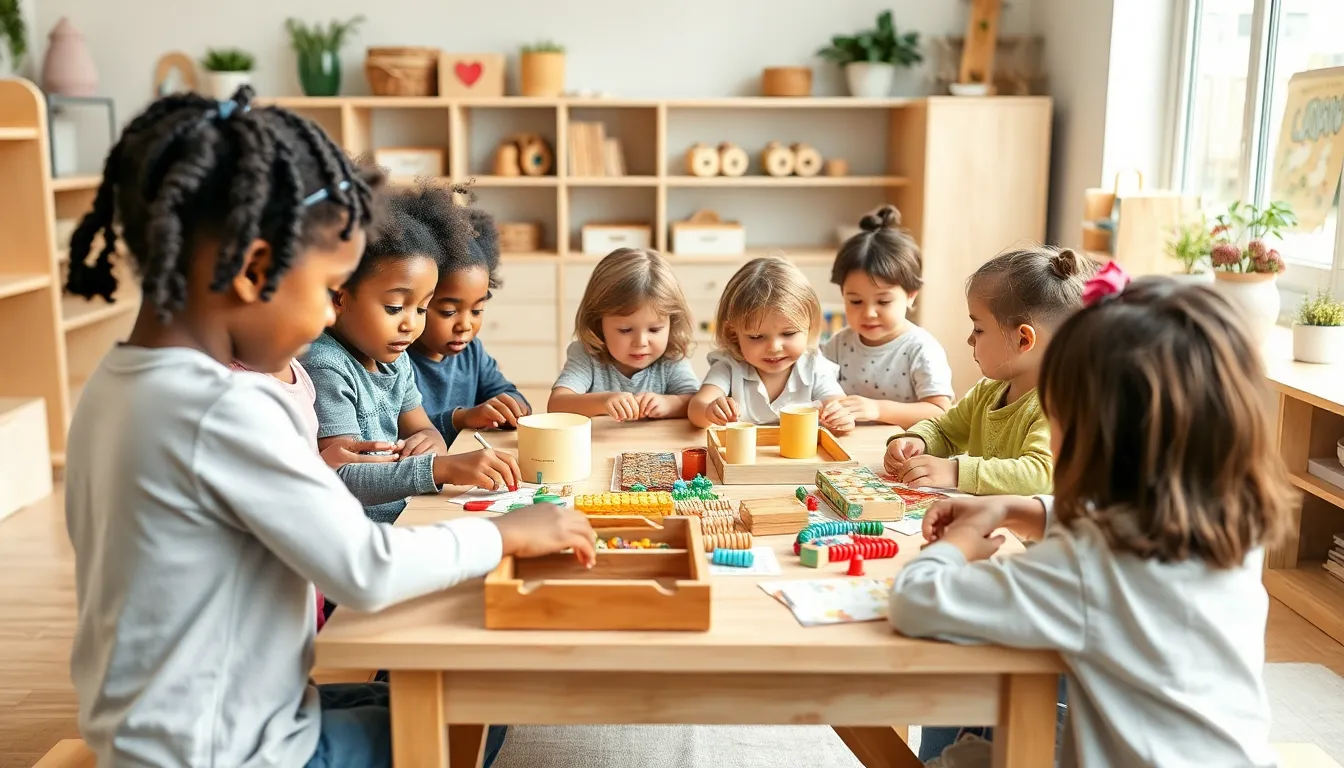Montessori education has gained immense popularity for its unique approach to learning. Rooted in the belief that children thrive when given the freedom to explore and discover, this method encourages independence and self-directed learning. By fostering a child’s natural curiosity, Montessori classrooms create environments where students can engage deeply with their interests.
The benefits of Montessori education extend beyond academic achievement. Children develop critical life skills such as problem-solving, collaboration, and resilience. With a focus on hands-on activities and real-world experiences, Montessori nurtures a love for learning that lasts a lifetime. As parents and educators seek effective ways to enhance children’s development, understanding the advantages of the Montessori method becomes essential.
Table of Contents
ToggleOverview of Montessori Education
Montessori education emphasizes child-centered learning, fostering autonomy and self-discipline. This method encourages exploration andallows children to direct their learning experiences. Classrooms feature mixed-age groups, enabling peer learning and collaboration.
Montessori materials are specially designed to engage multiple senses, promoting hands-on learning. These materials aid in the development of cognitive, social, and emotional skills. Children learn at their own pace, which nurtures a love for learning and cultivates intrinsic motivation.
Teachers in Montessori environments serve as guides, facilitating rather than dictating. They observe students and introduce new concepts based on individual interests and developmental stages. This tailored approach accommodates diverse learning styles, catering to each child’s unique needs.
The Montessori method also integrates practical life skills into the curriculum. Children participate in activities like cooking, cleaning, and organizing, which build independence and responsibility. These skills contribute to greater confidence and self-worth.
Research indicates that children in Montessori settings often outperform peers in traditional education on standardized tests. They demonstrate enhanced problem-solving abilities, critical thinking skills, and a strong sense of community. Overall, Montessori education fosters a holistic development approach that prepares children for lifelong success.
Cognitive Benefits of Montessori

Montessori education offers numerous cognitive benefits, enhancing children’s learning processes and intellectual growth. Two notable advantages include enhanced critical thinking skills and improved problem-solving abilities.
Enhanced Critical Thinking Skills
Children in Montessori classrooms engage in self-directed projects that encourage critical thinking. Classroom environments promote exploration and inquiry, allowing children to ask questions and seek answers independently. Montessori materials challenge assumptions and invite experimentation, fostering analytical thinking and reasoning. As children navigate complex tasks, they develop the ability to evaluate information critically and draw conclusions. Research shows that this method significantly enhances children’s cognitive development, equipping them with lifelong critical thinking skills.
Improved Problem-Solving Abilities
Montessori education emphasizes real-world problems, encouraging children to solve challenges actively. Through hands-on learning experiences, children learn to analyze situations and devise creative solutions. This approach builds resilience and perseverance, essential traits for problem-solving. Collaborative activities, such as group projects, further enhance these skills by promoting teamwork and diverse perspectives. Studies indicate that children in Montessori programs excel in problem-solving tasks compared to peers in traditional settings, reflecting the effectiveness of this educational model in developing logical reasoning and adaptive thinking.
Social Benefits of Montessori
Montessori education offers significant social benefits, enhancing children’s interactions and relationships in diverse learning environments. This approach not only nurtures independence but also builds collaboration skills among students.
Fostering Independence
Independence is a cornerstone of the Montessori methodology. Children choose activities based on their interests, allowing them to make decisions and manage their time. This autonomy encourages confidence, as they learn to handle tasks without constant adult supervision. For instance, engaging in practical life skills—like preparing food or organizing materials—instills a sense of responsibility and self-reliance. As a result, children demonstrate a greater capacity to tackle challenges independently, building a strong foundation for future social interactions.
Building Collaboration Skills
Montessori environments promote collaboration through mixed-age classrooms. These settings facilitate peer mentoring, where older children guide younger ones in activities. This interaction encourages teamwork and enhances communication skills, as children learn to express their ideas and listen to others. Group projects often highlight the importance of cooperation, fostering a sense of community and belonging. Research shows that children who collaborate in learning experiences enhance their social and emotional skills, preparing them for positive relationships in diverse settings.
Emotional Benefits of Montessori
Montessori education significantly enhances emotional development in children. Through its unique approach, it promotes self-worth and emotional intelligence, essential for overall well-being.
Increased Self-Esteem
In Montessori environments, children actively engage in their learning. They choose activities that align with their interests, fostering a sense of ownership over their education. Achieving goals, whether through completing tasks or mastering new skills, boosts their self-esteem. Research shows that children in Montessori settings report higher levels of self-confidence compared to their peers in traditional classrooms. As they gain independence and refine their abilities, children internalize a belief in their capabilities, establishing a solid foundation for lifelong self-assurance.
Better Emotional Regulation
Montessori education encourages children to navigate their emotions in a constructive manner. By allowing them to explore their thoughts and feelings freely, it cultivates a deeper understanding of emotional responses. Children develop strategies for self-calming and expressing emotions effectively, which enhances emotional regulation. Studies indicate that those in Montessori settings demonstrate improved impulse control and emotional resilience, equipping them to handle challenges more effectively. This emotional flexibility leads to healthier interactions and relationships, fostering a supportive learning environment.
Long-Term Impacts of Montessori Education
Montessori education delivers lasting impacts that extend far beyond early childhood. Research highlights that children who experience Montessori learning environments demonstrate superior academic achievement and a deeper love for learning throughout their educational journey.
Academic Achievement
Montessori students often excel academically as they progress through different levels of education. Studies indicate that these students consistently outperform peers in both mathematics and reading comprehension. For example, a 2017 study published in the journal Science found that Montessori graduates scored higher on standardized tests compared to students from traditional schools, showcasing their developed problem-solving and critical thinking skills.
Social Skills
Long-term studies show Montessori education fosters strong social skills. Former Montessori students report higher levels of cooperation, empathy, and conflict resolution abilities. These skills stem from the collaborative nature of Montessori classrooms, where children engage with peers of varying ages. They practice communication and teamwork, which translates to success in diverse social settings.
Emotional Development
Montessori education significantly influences emotional well-being. Former students demonstrate improved emotional regulation and self-discipline. A 2015 study in Child Development indicated that Montessori participants exhibit greater self-control when compared to their traditionally educated counterparts. This long-term emotional resilience supports healthier interpersonal relationships and enhances overall life satisfaction.
Lifelong Learning
Montessori education instills a love for learning that often persists into adulthood. Individuals exposed to this method report ongoing curiosity and an intrinsic motivation to seek knowledge and skills. Many Montessori alumni pursue higher education, engage in lifelong learning opportunities, and actively participate in community initiatives, contributing positively to society.
Independence and Responsibility
Montessori environments cultivate independence and responsibility in students. As children choose their activities and set personal goals, they learn to take ownership of their education. This self-directed approach nurtures strong decision-making skills, preparing them for adult responsibilities in personal and professional arenas.
Conclusion
Montessori education’s long-term impacts span academic, social, emotional, and personal development. These effects collectively contribute to the formation of well-rounded individuals equipped to navigate various life challenges successfully.
Montessori education offers a transformative approach that nurtures children’s innate abilities and fosters a love for learning. Its emphasis on independence and self-directed exploration equips children with essential life skills that extend beyond the classroom. The collaborative and engaging environment encourages critical thinking and emotional intelligence, preparing students for future challenges.
As parents and educators recognize the profound benefits of this method, they can better support children’s holistic development. Montessori education not only shapes academic success but also cultivates strong social skills and emotional resilience. By embracing this unique educational philosophy, families can contribute to raising confident, capable individuals ready to thrive in an ever-changing world.




